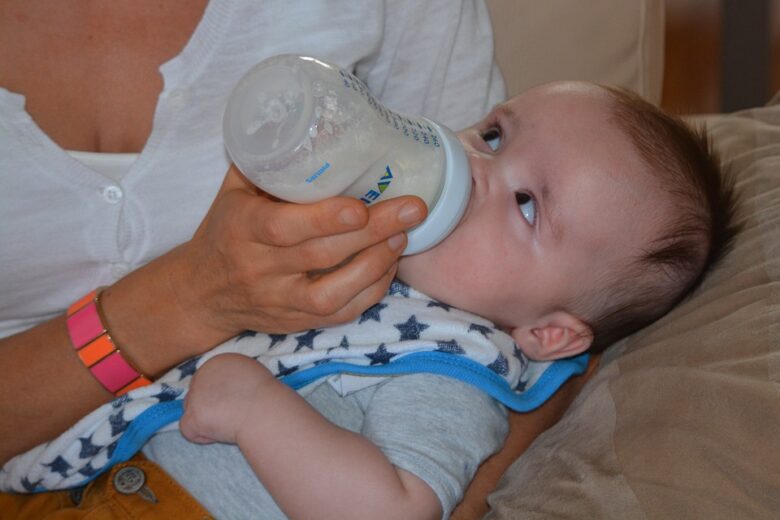
How Do I Find Safe Organic Baby Formula?
The birth of a baby in a family is always joyed, excitement, anticipation and anxiety. With the arrival of a baby, your world has changed – you have taken responsibility for your baby’s life and health. You want to protect your baby from trouble and illness and provide her with the best nutrition.
Mother’s breast milk is a natural food for newborns. It contains all the nutrients needed for the development and growth of your baby in the first months of life. Except for specific contraindications (certain diseases, such as HIV), breast milk is the safest source of nutrients, vitamins and energy, because it contains no additional, harmful or contaminating substances. Breast milk fully covers a baby’s nutrient needs for the first 6 months of life, continues to meet at least half of a baby’s nutrient requirements from 6 to 12 months, and covers a third of those needs in the second year of life. That is why some moms are recommended to add a lactation powder from www.lovemajka.com to their diet to help moms increase their milk supply.
Reasons to switch to formula

But there are a number of reasons why an infant is switched to artificial feeding. A common one is medical contraindications. If the mother has a serious illness associated with a hospital stay and takes medications that are incompatible with breastfeeding, breastfeeding will have to be abandoned. On the child’s side, there are also contraindications to breastfeeding. These may be hereditary diseases characterized by intolerance to breast milk. These are galactosemia, leukosis, phenylketonuria. Another reason for the transfer of the child to artificial feeding – not enough milk from the mother. Women worry that the baby is undernourished and begin to supplement her with formula.
Different reasons imply different ways of weaning your baby. If breastfeeding is strictly forbidden, it is stopped completely. Sometimes giving up breastfeeding is a temporary measure, and after circumstances change, mothers return to breastfeeding. The most convenient option for feeding formula is to switch your baby to mixed feeding.
So, if you are determined that artificial feeding is necessary, then you need to choose a safe formula for your baby. “Kindly have a look at MyOrganicCompany online store– they have a wide range of organic certified and absolutely golden standard baby formulas available. Follow these recommendations:
- Consult with your pediatrician;
- Carefully read the packaging;
- Breast milk substitutes should be appropriate for your baby’s age;
- Start the introduction of formula with mixed feeding (formula + breast milk)
- Follow bottle-feeding intervals (3-3.5 hours);
- Follow the daily feeding ration;
- The baby should not be malnourished or overeaten;
- Dilute the formula clearly according to the instructions on the package and only with boiled water 37 degrees °C;
- Feed your baby from a bottle only with freshly prepared formula; -Dilute the formula strictly according to the package instructions.
- Do not give your baby anything that he/she has not finished at any time during the next feeding. Each feeding – fresh formula;
- If you have problems with digestion, stools, various rashes, consult a doctor immediately!
Stage of baby formula

In order to choose the right formula for your baby, you should always consider the age rating. There are markings on the package of baby food that will help you quickly find the right milk formula:
- “Pre” or “0” – for premature infants and low birth weight babies (less than 2,500g).
- “1” – for infants 0-6 months.
- “2” – for infants 6-12 months.
- “3” – for children over 1 year of age.
- “4” – less common, denotes products for children after 1.5 years of age.
Milk formulas can be found on the market with averages that are suitable for babies in their first year of life. This is convenient for the mother because she does not have to go through a period of adaptation to a new diet when she reaches 6 months of age. These foods may not be well-balanced in terms of BW (proteins, fats, carbohydrates), vitamins and micronutrients, so there is a risk of vitamin deficiency in the baby.
Adapted Baby Milk Formula

For babies, only adapted milk formulas should be used, which are easy to digest and do not cause digestive disorders. They all contain an adjusted amount of BW, standard vitamins and minerals. In addition, the composition may contain beneficial components:
- Cysteine and taurine – amino acids that are needed for brain formation, eye health and proper metabolism
- Lecithin and carnitine – help break down fats in the intestines and improve their absorption;
- Lactose – has a positive effect on intestinal microflora, improves motility of the gastrointestinal tract
- Oligosaccharides and lactulose – facilitate the growth of useful microorganisms in the gastrointestinal tract, prevent dysbacteriosis;
- Omega acids – are necessary for proper growth and development, the formation of the nervous system of the baby.
Types Of Baby Formula

In general, all baby formula is divided into two groups: general and special. The first category is intended for healthy infants and contains the standard amount of micronutrients that a baby needs at a certain stage of development. The second group is a medicinal food which corrects illnesses or prevents their appearance. In the range of specialized mixtures, there are the following categories:
- Hypoallergenic;
- Anti-reflux (for frequent regurgitation)
- Sour milk (for colic, constipation, intestinal dysbacteriosis)
- Lactose-free;
- Soy (for cow’s milk allergies)
- With a high iron content (for the correction of anemia);
- For premature and low-birth-weight infants (with increased amounts of proteins and vitamins).
On organicsbestshop.com you will find anti-reflux, hypoallergenic, biodynamic, and even more.
There is another type of therapeutic formula, for children with rare congenital diseases (for example, phenylketonuria, cystic fibrosis). They are sold by special prescription, are expensive, and are often given by the state. Cystic Fibrosis is a genetic disease that affects most of our organs, you can turn to this site withpower.com to learn more.
Women’s milk is high in fat, particularly palmitic acid in its beta form, which is a valuable source of energy. To replicate the composition of breast milk, palm oil, which is high in this fatty acid, was added to formula. Unlike milk fat here, palmitate is in the alpha form, so it is poorly absorbed in the intestines of the baby and partially excreted in the feces unchanged.
Palm oil causes heated debate among parents: most believe that negligent manufacturers add a harmful technical product that can enter the blood and clog blood vessels. Such claims have no scientific basis.
Many manufacturers have decided that adding palm oil is impractical because of poor digestibility. In the premium product lines is palmitate from milk fat, which is absorbed much better.
Palm oil is not harmful to the baby’s body, but it will not do any good either. If possible, you should choose baby formula with palmitic acid extracted from milk fat.
How To Understand That Milk Formula Doesn’t Fit Your Baby

There are cases when the formula is not suitable for a baby. This can be determined by the following signs:
- Frequent regurgitation and vomiting after feeding;
- Increased frequency of stools;
- The occurrence of a stinky or sour smell in the stools;
- Redness and rash on the skin
- Poor weight gain
- Weakness and lethargy.
In this case, you need to see a doctor and change the milk formula.
So, to choose the best for your baby, choose adapted organic milk formula, selected according to the age – the best option for artificial feeding of healthy babies, if the woman can not breastfeed. They are easy to digest and contain the nutrients necessary for growth and development. And to solve health problems (colic, constipation, frequent regurgitation) there is a therapeutic baby food, which should be prescribed by a doctor.




